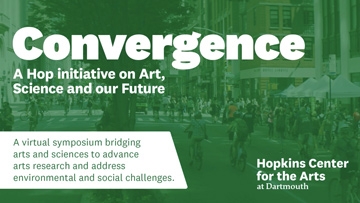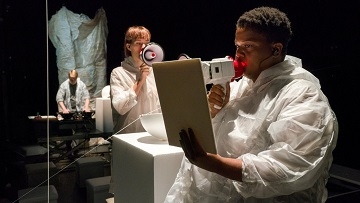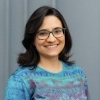
Now on sale to Hop Members at the Connecter level and above.
Log In for Tickets×

A Hop initiative on Art, Science and our Future.
The Convergence series is an embodiment of the Hopkins Center's commitment to making the arts indispensable to all academic disciplines, bridging arts and sciences to address urgent challenges including climate change and other global ills.
Visit the webpage for the February 2021 Convergence Symposium >
Uniting the Arts and Sciences for a Better Education and Future
How do we prepare the best doctors, computer scientists, engineers and scientists?
By making sure that their education includes not only STEM (science, technology, engineering, mathematics and medicine) courses but also rigorous, relevant learning in the arts and humanities. According to a mounting body of evidence, the skills and knowledge this learning provides help students enter the workforce, live enriched lives, become active and informed citizens and, as STEM professionals, deal with the complex challenges posed by a rapidly changing world.
Exploring that notion and the educational practices that put it into action is the purpose of "Convergence," a free virtual symposium hosted by the Hopkins Center for the Arts at Dartmouth on Thursday, February 11th and Friday, February 12th. The final of 21 such events held at universities across the nation over 18 months, the symposium was originally scheduled for last spring and has been reimagined in a virtual format. It will bring together researchers, artists, students and higher-education administrators to explore how and why to bridge the divide between arts and sciences in the academy.
"Convergence" is not only a symposium, but a new Hopkins Center initiative focused on harnessing the power of the arts to change attitudes and motivate people toward action on climate change and energy issues. With support from The Arthur L. Irving Institute for Energy and Society, Convergence also includes:
- A February 11, 7 pm presentation featuring dancer/choreographer/scholars Emily Coates and Manou Phuon, incorporating a discussion, video, and a movement workshop related to their in-progress dance work inspired by ecological and astronomical research; their works will be further developed during a summer 2021 on-campus residency.
- The February 11-17 on-demand screening of 2040, a documentary about the central place of clean energy in shaping a world to pass on to today's children.
- A series of events running through spring and summer 2021 and beyond, including presentations, showings, and discussions, that delve into interdisciplinary projects and highlight arts integration for real-world change.
- The fall 2021 presentation of The Force of Things: An Opera for Objects by award-winning composer and Dartmouth music professor Ash Fure and the International Contemporary Ensemble. This site-specific, sonic installation rumbles with the impact of climate change and has been described by the New York Times as "raw, elemental and richly satisfying."
The "Branches From the Same Tree" Project
The symposium is the culmination of a multi-year project of a2ru in partnership with the National Academies of Sciences, Engineering and Medicine. Focused on studying the evidence surrounding integrating disciplines in higher education, the project's history is as follows:
- 2015: A meeting of more than 110 scientists, engineers, artists, humanists, educators, policymakers and industry executives convened by NASEM leads creation of a committee tasked with examining the evidence behind the assertion that educational programs that mutually integrate learning experiences in the humanities and arts with science, technology engineering, math, and medicine lead to improved educational and career outcomes for undergraduate and graduate students.
- 2018: The committee publishes a report titled The Integration of the Humanities and Arts with Sciences, Engineering, and Medicine in Higher Education: Branches from the Same Tree, concluding that the evidence does in fact support that assertion.
- 2018-2020: 21 town halls across the country gathering leaders and practitioners in a variety of fields to discuss and examine the findings of the NASEM report and collaborate on ways to integrate the findings into their regions and institutions.
Questions about Convergence? Please contact Samantha Lazar, Curator of Academic Programming at samantha.c.lazar@dartmouth.edu.
The Convergence Series is made possible in part by support from The Arthur L. Irving Institute for Energy and Society
In The News

Hopkins Center's 'Convergence' Series highlights intersection of arts and science
The symposium, which featured presentations from professors and artists, kicked off the Hop's "Convergence" series, a joint venture with the Irving Institute for Energy and Society focused on...

Review: An 'Opera for Objects' Makes Music Out of Fear
Aug. 7, 2018: The New York Times reviews "The Force of Things: An Opera for Objects."
Contact Us

Questions about Convergence?
Please contact Samantha Lazar, Curator of Academic Programming
